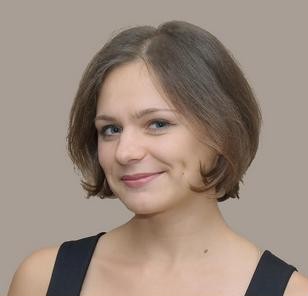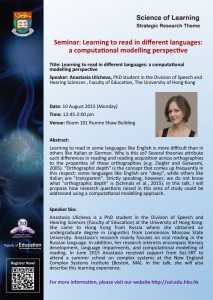Learning to read in different languages: a computational modelling perspective

Speaker: Anastasia Ulicheva, PhD student in the Division of Speech and Hearing Sciences , Faculty of Education, The University of Hong Kong
Date: 10 August 2015 (Monday)
Time: 12:45-2:00 pm
Venue: Room 101 Runme Shaw Building
Register
Abstract:
Learning to read in some languages like English is more difficult than in others like Italian or German. Why is this so? Several theories attribute such differences in reading and reading acquisition across orthographies to the properties of these orthographies (e.g. Ziegler and Goswami, 2005). “Orthographic depth” is the concept that comes up frequently in this respect: some languages like English are “deep”, while others like Italian are “transparent”. Strictly speaking, however, we do not know what “orthographic depth” is (Schmalz et al., 2015). In this talk, I will propose how research questions raised in this area of study could be addressed using a computational modelling approach.
Speaker bio:
Anastasia Ulicheva is a PhD student in the Division of Speech and Hearing Sciences (Faculty of Education) at the University of Hong Kong. She came to Hong Kong from Russia where she obtained an undergraduate degree in Linguistics from Lomonosov Moscow State University. Anastasia’s research mainly focuses on oral reading in the Russian language. In addition, her research interests encompass literacy development, language impairments, and computational modelling of reading. In June 2015 Anastasia received support from SoL-SRT to attend a summer school on complex systems at the New England Complex Systems Institute (Boston, MA). In the talk, she will also describe this learning experience.



